The Message of Muhammad Iqbal
A Short Note on the Occasion of Iqbal Day
in Pakistan, Friday November 9
Farhan Shah, Muslim Process Philosopher
Muhammad Iqbal (1877-1938) would be the first to remind us that in the 21st century we have a very high calling: to exercise our inescapable freedom, in constructive ways, for the well-being of all, in a spirit of world loyalty. By freedom Iqbal means decision-making: choosing among diverse possibilities in the immediacy of the moment, in the context of the wider web of life. As creatures among creatures on a small but beautiful planet, decision-making is part of our very essence. From the day we are born, we carry within our bodies potentials for empathy and hatred, creativity and blind reproduction, cooperation and cruelty, respect and callousness, good and evil. We feel these potentials within our very being as promptings and urges, as affective lures. But it is we ourselves, not the urges, who actualize the urges – some of them so destructive and others so life-enhancing. Indeed, we actualize these potentials, again and again, individually and collectively.
For Iqbal, the future does not come to us already settled, as a pre-existing order. We help create the future, moment by moment, by the decisions we make within our own context. Sometimes we make terrible decisions at great cost to others, ourselves, and the earth. And sometimes we make wonderful decisions, adding a beauty that did not exist beforehand. We can be agents of terror or wonder. Either way we are free. Our noble calling is, for Iqbal, not simply to be free. It is to create futures that are good for people, other creatures, and the earth: to become, as the Qur’an puts it, vicegerents on a small but beautiful planet. This is what it means to be a human being and to be a Muslim. It is to accept and live from the calling to add goodness and beauty to the world.
According to Muhammad Iqbal, socially constructive modes of behaviour have more value than merely praying or being engrossed in religious ceremonials in order to satisfy private inclinations. In short, for Muslims, as Iqbal reminds us, true Islam adopts a relational framework, building upon the metahistorical values of the Qur`an to prevent structural abuses of humanity`s intrinsic dignity and affirm basic dignity of each person, without leaving the more-than-human world behind. The express purpose is moral and social transformation in quest of equality and justice and ecological sustainability: or eco-justice.
Today, of course, many Muslims do not think this way. They are trapped by religious structures that are inconsistent with the Qur'an and the wisdom of Iqbal`s humanistic philosophy. They see the Qur'an as constraining but not emancipating. The Qur’anic scripture, when freed from the shackles of sterile, atomistic and ideological interpretations, points toward an emancipating view of human potential and human organisation that is respectful of the dignity of each and every perspective, awed by the beauty of the natural world, and encouraging of an “integral ecology” that lives with respect and care for all life on our planet earth.
We can speak of a kind of Islam that truly is constructively postmodern. It partakes of the best of modernity: science, respect for individual rights, democracy. And yet it transcends the dark dimensions of modernity: its emphasis on the impersonal objectification of nature and other organisms, the desacralisation of the world, a rejection of the role of community in human well-being (the principle of interrelationality), an overemphasis on value-free science at the expense of morality. It is postmodern, not premodern. It is Islam's offering to the world and, for that matter, to itself. Iqbal calls Muslim's to receive the offering and step out, in colleague with people of other faiths and people without faith, of their comfort zones toward a future in which the voice of human dignity and the sacredness of all life is audible, before it is too late.
Iqbal considered humanity`s ontological dignity, and, furthermore, the care for the world as a sacred ground, to be the gist of a spiritual democracy and the sum total of the Qur`anic ethos. The notion of intrinsic human dignity represents a powerful assertion about human status capable of having a centripetal effect on our political, moral and legal practices. Humanity is undergoing a massive turmoil politically and morally. And in such nervous times, the need for a unifying and sustainable idea of a “higher humanity” – the notion of human dignity being inherent/absolute/interchangeable/irreducible and thus setting itself beyond the instrumental notion of dignity linked up to price and functionalism (dignity as a function of human utility) – is of paramount importance to the moral and intellectual elevation of the human species as an organic whole.
The message of Iqbal is not restricted to Muslims only. It is the message of a philosopher, profoundly shaped by the Qur`anic teachings, who addresses himself to humanity en masse. Iqbal`s is a message of world-loyalty. In his own words: "So long as men do not demonstrate by their actions that they believe that the whole world is the family of God, so long as distinctions of race, colour and geographical nationalities are not wiped out completely, they will never be able to lead a happy and contented life and the beautiful ideals of liberty, equality and fraternity will never materialise.”
As the Muslim philosopher sought to “string together the separated beads of the rosary”, so must we, in the name of an all-embracing principle of creational dignity persuade our fellows to transcend narrow and parochial interests in the quest for spiritual democracies in which people live with care and respect for each other and other creatures. This is why we all need to hear Iqbal again. As Prof. Charles Taylor puts it, “In this atmosphere of suspicion and anger, it is a joy to hear the voice of Iqbal, both passionate and serene. It is the voice of a soul that is deeply anchored in the Qur`anic Revelation, and precisely for that reason, open to all the other voices, seeking in them the path of his own fidelity. It is the voice of a man who has left behind all identitarian rigidity, who has broken all the idols of tribe and caste to address himself to all human beings.” By reclaiming Iqbal`s philosophy within the context of today`s challenges of global nature, there is indeed hope for our planet Earth.
Happy Iqbal Day.

